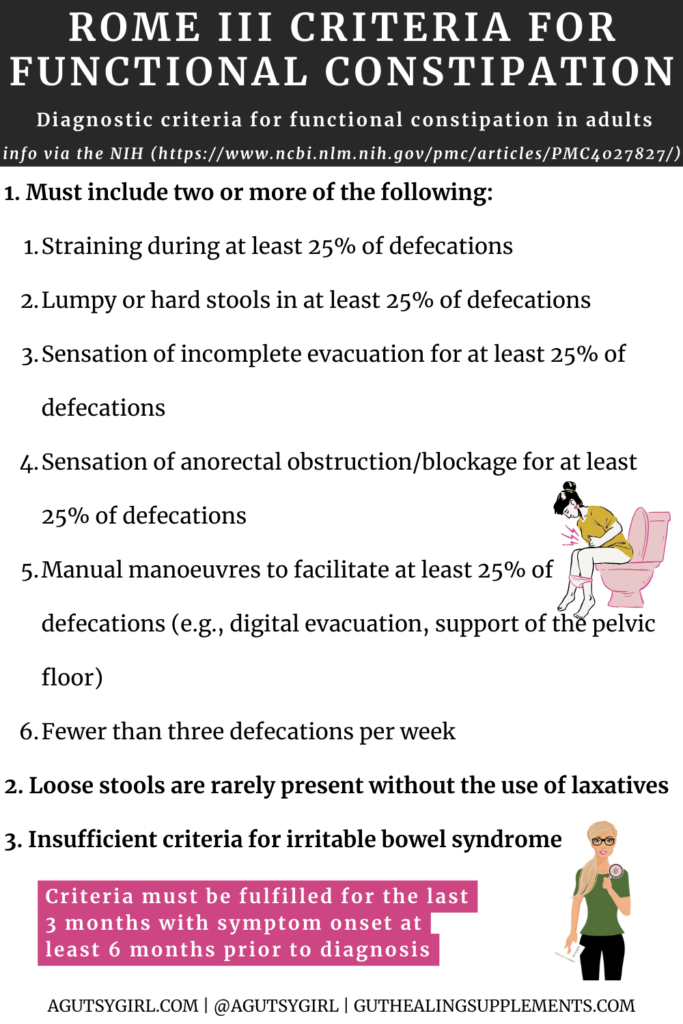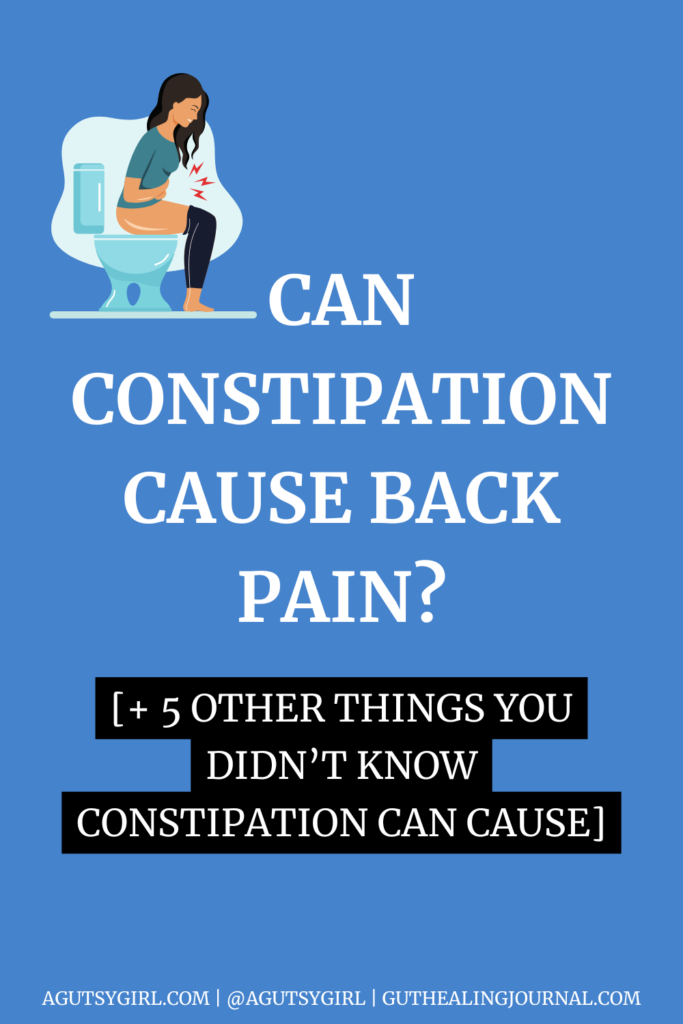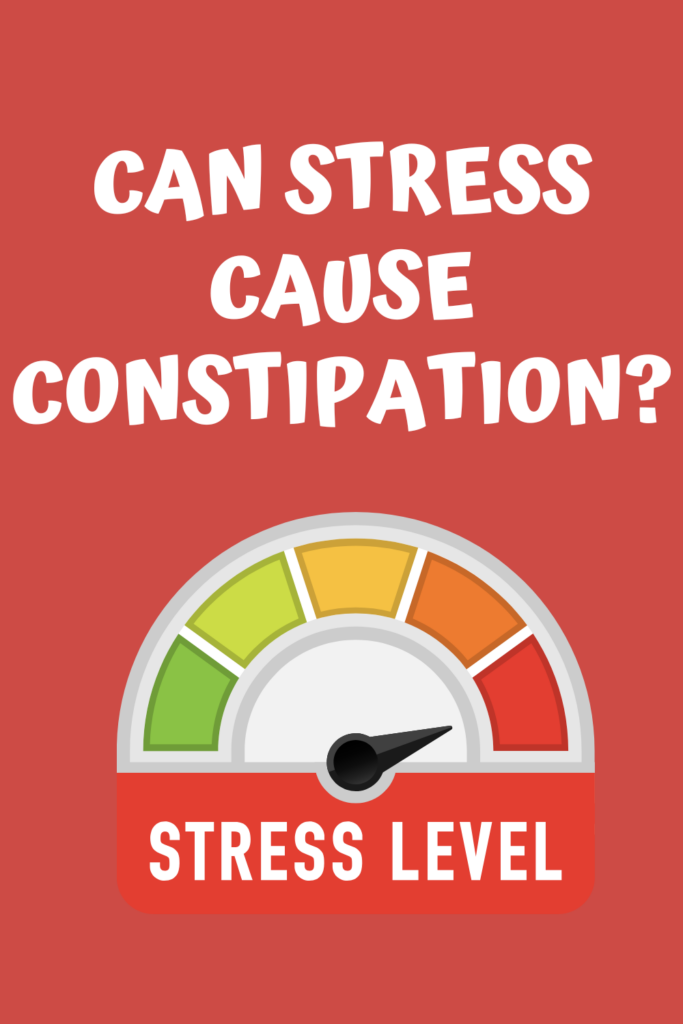You’ve been asking things like, “Can constipation cause back pain?” And “Why does constipation cause xyz?”
Constipation is far more serious than most know. The negative ramifications of not doing the daily poo are plenty.
The goal is to discuss them in more detail.
But first, here’s something to know a little more about; functional constipation.
If you find yourself asking any of these constipation questions, chances are good that you have functional constipation.
Functional Constipation
According to the NIH,
Functional constipation becomes a concern when it develops into a chronic disorder characterized by abnormal defecation, that is, persistent difficult or seemingly incomplete defecation and/or infrequent bowel movements, without any anatomical or physiological causes. It may have a neurological, psychological, or psychosomatic cause.
Here is an overview for functional constipation criteria.

Identify with any of it?
Note: Even the NIH recommends (per the article),
Keeping a stool diary and bowel training may help.
In the 90-day gut healing journal, Healing Blooms from Within, you will keep meticulous track of your daily stools.
The journal includes a beautiful rendition of the Bristol Stool Chart for you to refer to as well. (Yes, I said beautiful.)
Get your journal now by downloading the printable PDF HERE or let us send to you our printed, spiral-bound, hardcover journal.
Can Constipation Cause Back Pain [+ 5 other things you didn’t know constipation can cause]
Click HERE to save this post for later.

The short answer to “Can constipation cause (insert the issue)?” is YES, absolutely!
The most known and common symptom of constipation is the inability to eliminate. Unfortunately, this is often not the only symptom of constipation.
When elimination is not functioning properly, other processes in the body can go awry.
Most constipation occurs when the large intestine removes too much water from the stool. This makes the stool hard and challenging plus painful to eliminate.
Not only does constipation cause physical symptoms, it also makes most of us stressed. (It’s stressful feeling STUCK!)
Stress can absolutely cause constipation. The stress that comes as an effect of being constipated only makes the situation worse.
Stress activates the sympathetic nervous system which turns off the body’s “rest and digestion” function.
This makes it even more difficult to digest and mobilize food in the GI tract.
Can Constipation Cause Back Pain?
Yes! If your lower back feels achy or dull during periods of constipation, it’s not a coincidence.
When stool collects during constipation, the intestines swell. This causes them to press on nearby muscles or nerves creating pain in the lower back or abdomen.
The pain is usually achy and dull and extends from the abdomen through to the spine.
The pain can become worse as constipation continues and the intestines become more swollen.
If the pain is localized or sharp, it could indicate fecal impaction. Fecal impaction is when large, dry piece of stool become stuck in the intestines.
This situation is, however, much less common than constipation.
Can constipation cause nausea?
Yes, constipation can cause nausea (you likely know this from experience)!
Normally, food moves quickly through the stomach and small intestine to the large intestine before it is eliminated.
With constipation, the large intestine becomes full, and sometimes even backs up into the small intestine.
When this happens, recently consumed food is unable to move from the stomach to the intestines. This build up of food in the stomach can lead to bloating, nausea, and feeling like you’re completely full.
When food sits in the small intestine for longer than usual, the bacteria in the small intestine can overgrow and produce methane.
Continuous overgrowth in the small intestine can lead to SIBO.
Not only does methane gas in the intestines slow elimination, but can cause feelings of nausea when it accumulates.
Can constipation cause headaches?
Unlike back pain and nausea, the link between constipation and headaches is less direct.
It’s another chicken and egg scenario.
It is unclear whether constipation can cause headache, or whether constipation and headache are frequently experienced together as symptoms of the same underlying cause.
The most common causes of constipation and headache together are dehydration and nutrient deficiencies.
Chronic issues with constipation and headache together could indicate underlying root causes of food intolerances, GI issues like SIBO or leaky gut, chronic fatigue syndrome, autoimmune diseases, or other conditions.
Can stress cause constipation?

ABSOLUTELY! Stress affects the gut in three direct ways.
1. Activates the Sympathetic Nervous System (SNS)
When the SNS is activated, blood flow and energy are directed to vital organs and processes in the body and digestion halts.
Motility in the intestines slows down and food stops moving through the GI tract.
While this response to stress is great for survival (think: running from a bear who is chasing you), it is not great for keeping elimination regular.
Chronic stress continuously slows digestion which can lead to chronic or recurring constipation.
2. Increases Inflammation and Intestinal Permeability
When the intestines’ motility slows, inflammatory compounds are released.
This inflammation is damaging to the gut wall which acts as a protective barrier between the outside world and the rest of the body.
Damage from inflammation and stress increases the intestinal permeability of the gut wall which can cause leaky gut symptoms.
3. Damages Gut Bacteria
Because of the gut-brain connection, we know that mood disorders and stress often change the gut’s bacteria by altering the ratio between good and bad bacteria.
These alterations to the gut’s delicate microbiome can slow digestion and increase constipation.
Can constipation cause fever?
Similar to headache, fever is usually a co-symptom with constipation, not a consequence of being constipated.
Constipation and fever can both occur with certain viral, bacterial, or parasitic infections.
If you have both constipation and fever there is likely an underlying cause to both that’s different than the cause of the constipation.
What is Dyssynergic Defecation?
I’m no expert in the pelvic floor. However, problems with these muscles can cause many digestive issues since a woman’s pelvic floor muscles support the womb (uterus), bladder, and bowel (colon).
Dyssynergic defecation is a condition in which there is a problem with the way certain nerves and muscles function in the pelvic floor.
If you want more information on it, check out THIS article.
Constipation
Constipation is no joke.
If you haven’t experienced it, count your lucky stars.
And if you have, address it.
Sources: HERE, HERE, HERE, HERE, and HERE.
If you liked this post, you might also enjoy:
- 15 Ways to Deal with Constipation
- Is Stress Causing My Digestive Distress
- Pooping {17+ Pooping Questions and Answers}
Xox,
SKH
🤰 bloating be gone! weight loss through optimal gut health for women
💃ʜᴇᴀʟ ʏᴏᴜʀ ɢᴜᴛ. ʜᴇᴀʟ ʏᴏᴜʀ ʟɪfe.
🫶🏻 founder gutbyome.com


![Best Organic L-Glutamine Powder [Supplement for Gut Healing]](https://agutsygirl.com/wp-content/uploads/2024/01/l-glutamine-featured-image.png)

![Vision Board Ideas [How to Make a Mini Vision Board]](https://agutsygirl.com/wp-content/uploads/2020/11/woman-vision-board-desk-featured-agutsygirl.com_.png)


